A New Agricultural Marketplace Will Enhance Extension’s Mission in Lee County
go.ncsu.edu/readext?1026897
en Español / em Português
El inglés es el idioma de control de esta página. En la medida en que haya algún conflicto entre la traducción al inglés y la traducción, el inglés prevalece.
Al hacer clic en el enlace de traducción se activa un servicio de traducción gratuito para convertir la página al español. Al igual que con cualquier traducción por Internet, la conversión no es sensible al contexto y puede que no traduzca el texto en su significado original. NC State Extension no garantiza la exactitud del texto traducido. Por favor, tenga en cuenta que algunas aplicaciones y/o servicios pueden no funcionar como se espera cuando se traducen.
Português
Inglês é o idioma de controle desta página. Na medida que haja algum conflito entre o texto original em Inglês e a tradução, o Inglês prevalece.
Ao clicar no link de tradução, um serviço gratuito de tradução será ativado para converter a página para o Português. Como em qualquer tradução pela internet, a conversão não é sensivel ao contexto e pode não ocorrer a tradução para o significado orginal. O serviço de Extensão da Carolina do Norte (NC State Extension) não garante a exatidão do texto traduzido. Por favor, observe que algumas funções ou serviços podem não funcionar como esperado após a tradução.
English
English is the controlling language of this page. To the extent there is any conflict between the English text and the translation, English controls.
Clicking on the translation link activates a free translation service to convert the page to Spanish. As with any Internet translation, the conversion is not context-sensitive and may not translate the text to its original meaning. NC State Extension does not guarantee the accuracy of the translated text. Please note that some applications and/or services may not function as expected when translated.
Collapse ▲The Sanford Farmers’ Market is a bustling place. On any given Saturday, some 800 customers from Lee County and the surrounding area buy farm-fresh food, flowers, baked goods, crafts and more from as many as 25 vendors. During special events, such as the Strawberry Jammin’ celebration this spring, more than 2,000 people typically attend.
There is a festive mood. Shoppers enjoy live music and fellowship while supporting local agriculture.
“It’s a really nice atmosphere,” said Meredith Favre, NC State’s Extension local foods agent at the Lee County Center and the farmers market manager. “We have a lot of local folks who come on a regular basis, and we’ve had folks from Chatham, Wake, Durham, Moore, Harnett — a lot of different counties. I get many comments that folks feel very welcome at the market, both from vendors as well as customers. People are very excited to have the opportunity to gather and to meet their farmers and to have fellowship around food.”
The popularity of the farmers market has led to a problem, though. It has outgrown its space in a parking lot in downtown Sanford.
“We’ve had folks on the waiting list for a typical Saturday,” said Bill Stone, director of N.C. Cooperative Extension’s Lee County Center. “A couple of years ago, we recognized that we were going to eventually outgrow the current space. That parking lot was no longer going to hold the market.”
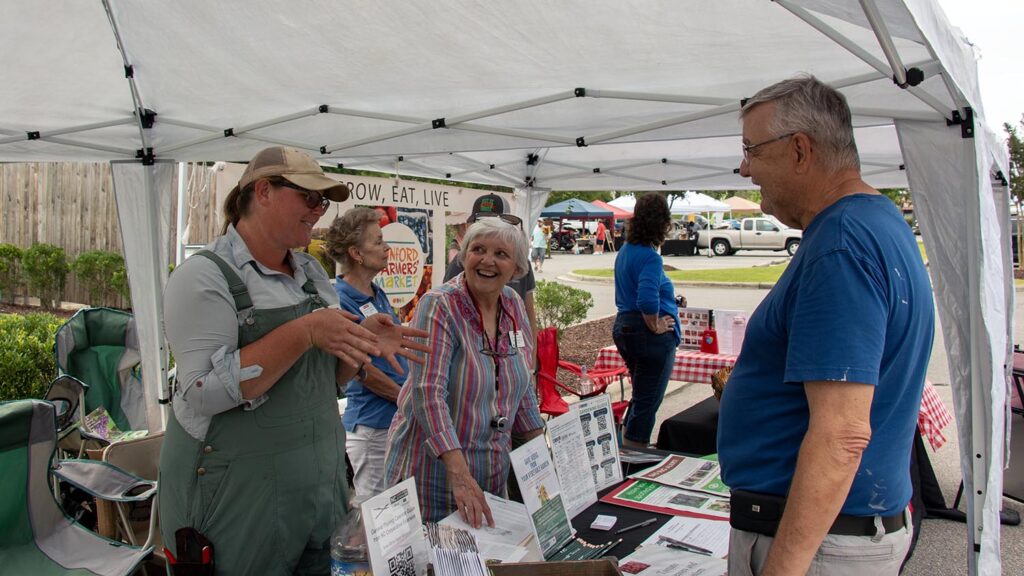
NC State horticulture agent Amanda Wilkins speaks to a patron of the Sanford Farmers’ Market. The market has outgrown its space, and a new agricultural marketplace is planned that will allow for more Extension programming.
Stone envisioned not just something bigger, but also something better — a permanent facility that would allow more space for vendors and customers. Along with early proponents of a more sustainable farmers market location, including Kelli Laudate, Executive Director of Downtown Sanford (DSI) Inc., and DSI board member Joni Martin, he imagined a space that would be a community hub, housing a new and improved farmers market on Saturdays, and be a space for Extension agents to conduct programs on other days.
The dream of a new Sanford Agricultural Marketplace is close to reality thanks to funding from a combination of private and public donations, including a generous gift from the Ruby and Ernest McSwain Worthy Lands Trust, a long-time NC State supporter. Groundbreaking for the facility took place on Nov. 21, and construction is scheduled to be complete in 2025.
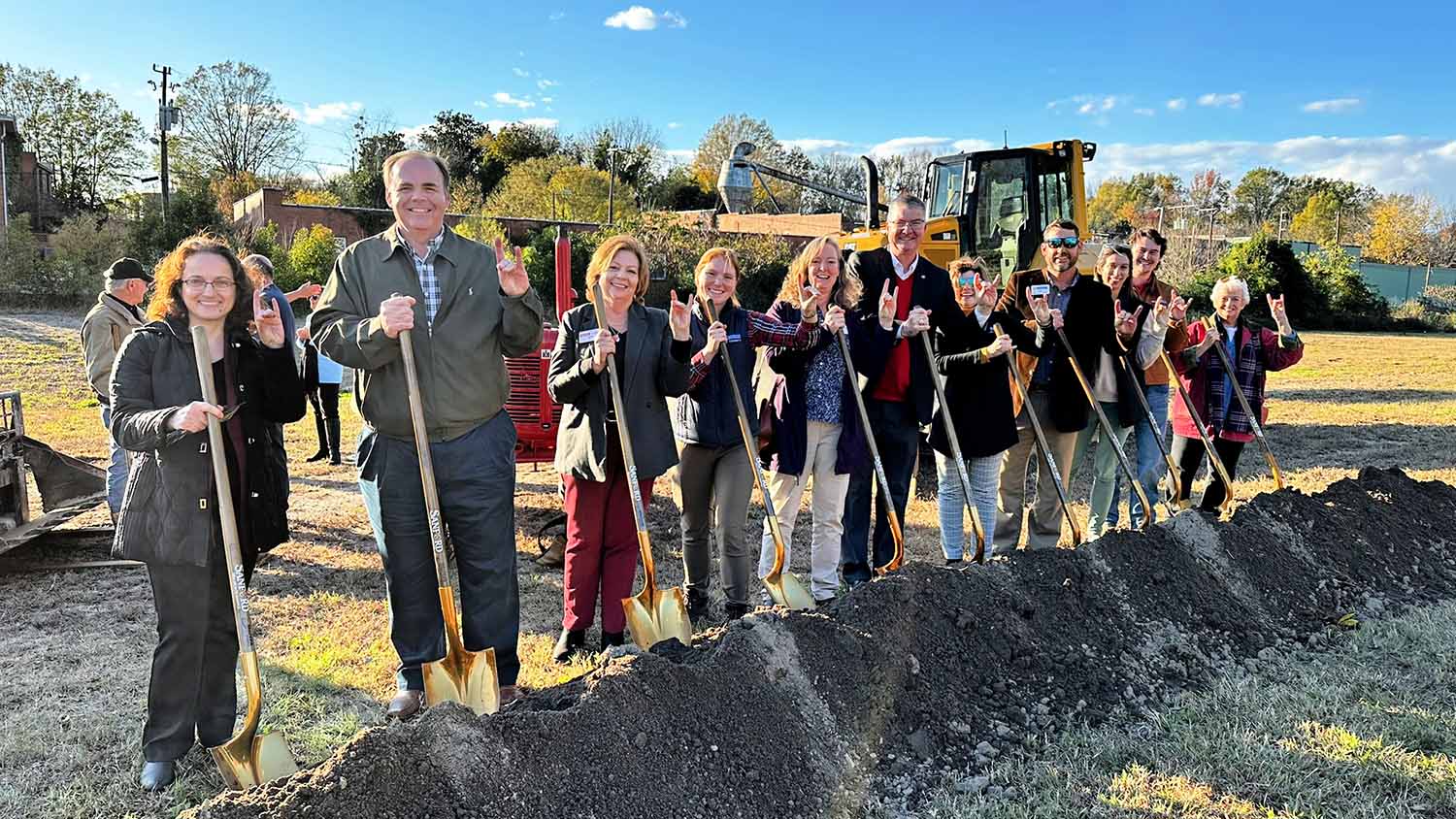
Representatives from NC State Extension and the College of Agriculture and Life Sciences participated in the groundbreaking for the Pilgrim’s Sanford Agricultural Marketplace on Nov. 21, 2024.
Pilgrim’s Pride, a poultry processing plant in Lee County, put in an initial $505,000 to kickstart the project. The city of Sanford allocated funds made available by the American Rescue Plan Act (ARPA). The new marketplace will serve as an anchor point to the Sanford Central Green, envisioned as an innovative community greenspace that can transform downtown and the surrounding neighborhood.
“Our major goal was to leverage these funds to transform our community for generations to come,” Mayor Rebecca Wyhof Salmon said. “We had the rare opportunity to jumpstart the next wave of revitalization while also being a resource for the vital work being done by Extension.”
The project has also received funding support from Lee County Farm Bureau, the North Carolina Tobacco Trust Fund, and the Rural Transformation Grant Fund through the N.C. Department of Commerce.
“We were able to demonstrate how this market project would benefit the people of Sanford and Lee County,” Stone said. “It kind of kept growing and growing at that point.”
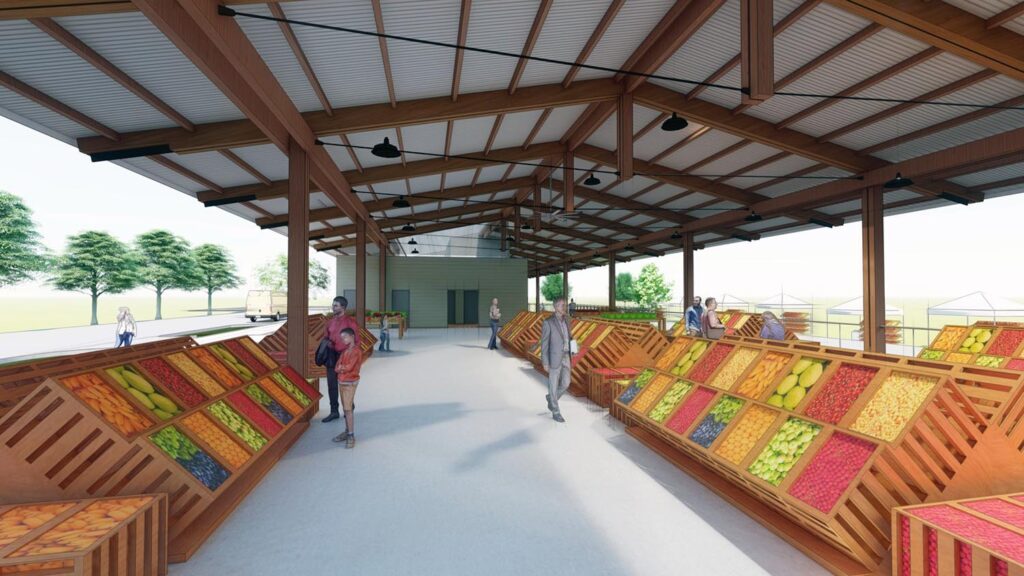
A rendering from Raleigh-based firm HH Architecture shows the covered pavilion that will house the Sanford Agricultural Marketplace.
Those and other funding sources would be sufficient to enable the construction of a covered pavilion in downtown Sanford that would be a marked improvement on the current popup market.
“Everything lined up and we were coming right along,” Stone said. “Everything was great.”
Great, but not quite enough for what he had imagined.
“In order to do all the education, the marketing, the outreach, the support, we needed some additional funding,” Stone said. “We were dreaming big, and we did not want to have to compromise the vision of what we knew this project could be.”
That’s when the Ruby and Ernest McSwain Worthy Lands Trust entered the picture.
Ruby McSwain, a longtime Lee County resident, was a noted philanthropist, especially to NC State. In 2002, she made a generous gift to the JC Raulston Arboretum, naming the Ruby C. McSwain Education Center building and complex. She served on the university’s NC Agricultural Foundation Board, was inducted into what was the University’s highest-level giving society in 2003, and received an honorary doctorate in humane letters in 2005. She was also given the 2010 Award of Merit by the NC State Alumni Association.
In addition, the trust McSwain established has funded more than $2 million in Extension and scholarship endowments benefitting Lee County students attending NC State. The McSwain Extension Education and Agriculture Center in Sanford is named because of her generosity and contributions to NC State’s College of Agriculture and Life Sciences (CALS).
“Our building is named in her honor,” Stone said. “Ms. Ruby was a very special lady, extremely generous, and an individual whose philanthropy has made a significant impact on agricultural and educational causes.”
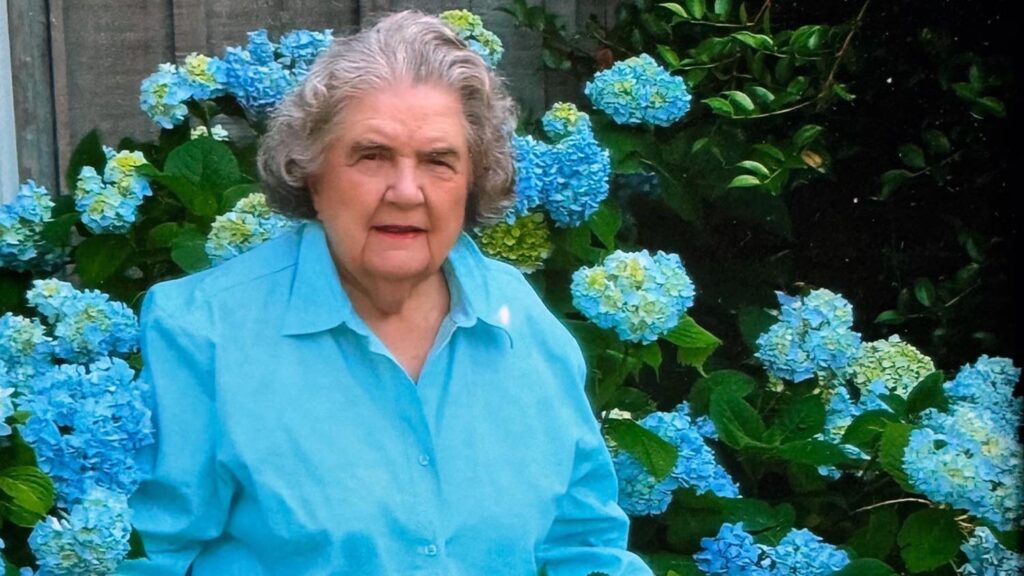
Ruby McSwain was a philanthropist who contributed to many NC State programs in Lee County and elsewhere. Her legacy continues through the Ruby and Ernest McSwain Worthy Lands Trust, which is helping fund the new Sanford Agricultural Marketplace.
She died in 2015 at the age of 97, but her legacy lives on through the work of the trust, which continues to contribute to causes she held dear.
Knowing of her desire to support agriculture and community causes through Extension in Lee County, Stone reached out to Ruby and Ernest McSwain Worthy Lands Trust trustees Lynn and Anita Blackmon about the Sanford Agricultural Marketplace.
“I shared with them that I thought this project would align with Ruby’s values and her vision for agriculture and in education and community development,” Stone said. “They wanted to be a part of this project and support it, and have graciously agreed to a gift of $1 million.”
The gift was given on the 25th anniversary of McSwain’s other significant contribution to the Lee County Extension center. On a visit to the county administration office to discuss another project, assistant county manager Jennifer Gamble showed Stone a special memento.
“She handed me a gold shovel that had been found stored in the closet and it had an engraved plaque on the handle,” Stone said. “It said Ruby and Ernest McSwain Extension Center, 19 June, 1999. It was the shovel that Ruby used at the groundbreaking for our building 25 years ago. That gift, at the time, was one of the single biggest investments in agriculture in this county. And now, her trust is about to invest $1 million in another trailblazing agricultural venture. The serendipitous timing of finding this shovel could not have been more fitting.”
The total gift is the largest private donation to the project. Half will go to the city of Sanford toward construction of the facility.
“We are so grateful for the overwhelming support the community has shown for this project, including the substantial public and private investments it has garnered,” Salmon said. “People are ready and excited to see the marketplace take shape.”
The mayor said the city has lofty goals for its partnership with Extension. Along with addressing food insecurity and preserving the city’s agricultural heritage, the project will usher in the next wave of redevelopment and revitalization.
“The marketplace will be transformative for downtown and East Sanford,” Salmon said.
The other half of the gift will be earmarked for Extension education and programming.
“It will be put into an endowment that Extension will have access to for on-the-ground programming, education outreach and personnel support,” Stone said.
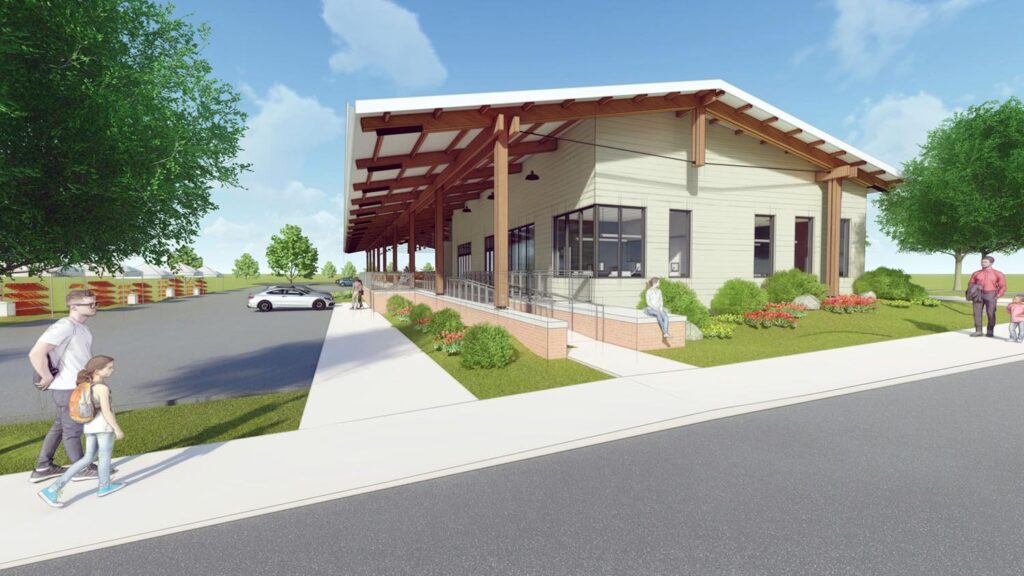
The Sanford Agricultural Marketplace will be a space where NC State Extension agents can take programs into the community.
The endowment will reside within NC State’s North Carolina Agricultural Foundation, which supports research, Extension and teaching activities within CALS.
The grant will help get this project to the finish line, Stone said, and fulfill the vision of an agricultural marketplace in the Sandhills region. The facility will support local agriculture by providing more space for the farmers market; help with food insecurity because of its location in a part of town that lacks grocery stores; and benefit the community through on-site Extension programs.
“It’s not only going to be a farmers market,” Stone said. “It’s going to allow us to expand what we’re able to offer. We’ll potentially be able to do some weekday markets. We’ll be able to host community health and wellness events. We’ll have a shared-use commercial kitchen. We will have meeting space. There’s a performing arts stage. It is going to be the kickoff of the next portion of the East Sanford downtown redevelopment.”
The market will be located in a part of the city that is economically distressed. It will benefit local residents by allowing participants in the U.S. Department of Agriculture’s Supplemental Nutrition Assistance Program (SNAP) to shop for fresh, nutritious food.
“There’s a lot of food insecurity in that area, so it opens up an opportunity for downtown populations to access local foods utilizing SNAP/EBT benefits,” Stone said.
Extension programming at the marketplace will include instructions in utilizing the benefits.
“We want to make sure that we have many food-based programs available and talk to recipients of those programs, how they can use their benefits at the ag marketplace as well as other farms around,” said Favre, Extension’s local food agent. “We plan to have different cooking programs that are going to showcase how people can stretch their food dollars, but while still purchasing local.”
Nutrition-focused cooking programs will take place at the teaching and demonstration kitchen.
“We’ll have it open during farmers markets so folks can come in, learn how to prepare foods that are in season, sample food, and do cooking classes,” Favre said. “We see it complementing the traditional role of the market. We’ve got the ‘how to grow it’ part, and now we’re going to show how to prepare the food.”
In addition, the space will provide an economic opportunity for anyone interested in starting a food-based business or sideline.
“There’s an opportunity for us to help farmers either expand into value-added products or help food entrepreneurs get started,” Favre said. “We can teach about how to make value-added products. We’ll get into labeling, and bring in experts to help farmers and food entrepreneurs know what they need to do to meet food safety regulations and how to market their products.”
Meeting space at the Sanford Agricultural Marketplace will allow Extension’s Lee County agents to expand programs for new and beginning farmers.
“We have different programs we offer now like Small Farm Boot Camp and farm school,” Favre said. “We’ll continue those types of programs in addition to partnering with area community colleges like Central Carolina to offer more opportunities for new and beginning farmers.”
One of those opportunities will be setting up a stall and a farmers market that will have more space. The new Sanford Agricultural Marketplace should be able to accommodate approximately 40 vendors.
“We’re really looking forward to having more space to spread out,” Favre said. “It will be nice to have it covered, an open pavilion with fans, and be more comfortable. We’re very excited for the marketplace to really bring the community together even more as we continue to grow. I think it has so much potential for our community.”
The project is currently in the bidding process. Groundbreaking should take place in the fall, with construction complete by the end of 2025. Stone said the gold shovel from 25 years ago will come out of retirement to once again start a major agricultural project that Ruby McSwain helped make possible.
“This is going to be a unique project with the farmers’ market, commercial and demonstration kitchens, as well as meeting and office space,” Stone said. “It is going to be a community-centric facility located right in the heart of downtown. We anticipate this becoming a regional destination for people to gather to learn about, celebrate and support agriculture, local foods, and the farmers who are producing it.”

